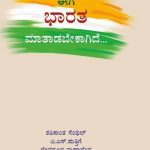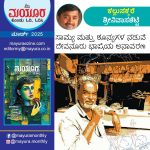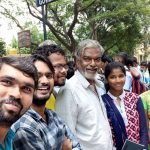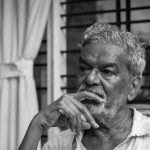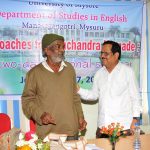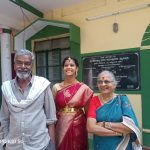The storyteller in my tales- DEVANURA MAHADEVA -THE HINDU
[Devanuru Mahadeva’s article Translated by V.S. Sreedhara and Published on – 15.5.2016 in The Hindu. ದೇವನೂರ ಮಹಾದೇವ ಅವರ ಈ ಲೇಖನವನ್ನು ವಿ.ಎಸ್.ಶ್ರೀಧರ ಅವರು ಅನುವಾದಿಸಿದ್ದಾರೆ. ಮತ್ತು ‘ದಿ ಹಿಂದೂ’ ಪತ್ರಿಕೆಯಲ್ಲಿ15.5.2016 ರಂದು ಪ್ರಕಟಿಸಲಾಗಿದೆ.]
The Kannada modernist movement in literature was at its peak then. I spent a lot of time with those writers and even wrote a few stories under their influence. But I felt they did not come naturally to me. I then wrote three other stories, each different. One was like a report, another lacked a centre. However, all had one thing in common: instead of being introspective and individual-centric, they were stories of my community.
Retracing those steps, I can probably say that my individual sensibilities were at that time displaced by a keenness to trace the sensibilities of my community. The stories, along with Odalala and Kusumabale that I wrote afterwards, were tagged ‘experimental’. Was I trying to pioneer change when I began writing? Looking back, I cannot see myself at the vanguard of any movement. Latvian writer Inga Able has this to say about the creative process, ‘A person lives in his/ her language like fish in water. That’s why authors do not know that much about their own work’. This must be so in my case also.
Whatever it was, these undirected, vagrant steps in the dark themselves put me on course and gave me a sense of direction. There on, my writing came to be more ‘oral’ and ‘folk’. But not exactly! For whatever needs be created, those objects and those lives, they must be waited on, listened to, ever so keenly, until language happens, in and through letter and word. Was my writing experimental? The great 9th century Kannada poet Pampa refers to the dialect of Puligere where he lived as the “kernel of Kannada”. Drawing from this dialect, Pampa distills the language of his poetry. In a similar vein, I used my dialect of Kannada as the ‘kernel’ of my writing. Today, language is used like clothing, but it must be like one’s own skin. Not just one’s skin, but one’s senses too.
This is equally true of the ‘folk’ element in my writings, which take off from the folk. The contemporary acquires a semi-folk character and goes on to effectively reconstruct reality. The folk element happens to the extent I become the folk, without ‘objectifying’ it. Whatever I get, that much I get. Nothing more, nothing less.
That is why the folk tales I have heard do not remain stories in my writing but are transformed into characters. For instance, in Kusumabale, the old woman Thuramma holds on to life in the hope that she will set eyes on a grandchild before she dies. Her worry becomes a character and sits beside her like a companion, sharing her joys and sorrows. Worry, as a character, has her worries too! And she communicates these to the old lady, even as she consoles her and provides answers to her woes. Friends in distress! While this gives them the zeal to live, it also gives them the grit to fight against the odds and face up to the harsh reality of their lives. In the process, they discover their own life force. InKusumabale, objects, people, and spirits find their own form; become characters with a language of their own, customs and world views. How much modern consciousness could I bring to a work of art that takes its life from excommunicated people?
The condition of the apartheid and the untouchable is quite similar in many ways, yet not the same. Perhaps the following quote from an earlier article of mine would make the point clear:
“Apartheid is a more recent wound, still raw and bleeding. Thousands of Blacks were massacred for protesting against the discriminatory apartheid laws… Whenever I think of this horror, I feel that the repression, cruelty, violence and the killings which may have taken place in ancient India to throw out an entire community of people from the Varna/Caste system and force them into accepting untouchability, were repeated in South Africa, in the form of Apartheid. Shall we say Apartheid was untouchability in its first phase, or shall we say that untouchability is the great-grandfather of apartheid?”
What Chinua Achebe told me after a visit to a village near Mysuru left me shaken. He said, “I saw untouchability in your villages and it has made me a sadder man forever. In Africa, we have people who are called ‘God Children’. It is regarded a sin if their blood is shed on earth. But here shedding the blood of Harijans is seen as a good deed!” Karl Marx, who calls the working classes the labouring people, describes the untouchables of India as ‘hard labouring people’. Untouchability has more to it than the decrees and customs that have created apartheid. If aborigines are given education and employment, they get entry into the fold. But even this is not possible for untouchables.
Indian history has used its ancient Sastras and its many gods as its henchmen, to keep the caste system alive. Untouchability continues all over India, although officially decreed unlawful. An incident I heard still haunts me. Prof. Mariswamy, at the time a high school teacher, was sitting in an upper caste pyol, waiting for a bus. An old man reprimanded him and asked him to move out of his sight. Recalling the incident, Mariswamy later said, “It was only after reading Ambedkar that I understood that we are victims of the caste system, and that untouchability is a deep wound of insult and humiliation. Earlier, we thought this was the way we had to live”.
The question keeps coming back: ‘How much of a rational, modern consciousness could I bring to a story of community, which is in a state of amnesia?’ A work of art, if anything, has to happen through shared experience. How? Perhaps like water deep down in the earth that trickles out only when dug; or like a seed that holds the tree of tomorrow. I had to subsume my modern consciousness to become one with a collective sensibility. Moreover, as there are few people who could read among my own, who must I write for? If I wrote for elites, I would be handling the experiences of my people as something of anthropological interest. It would be like rubbing salt into open wounds. If, at the core, the sensitive act of creativity means becoming another being, how was I to come to terms with preserving this beacon light along with bearing the burden of untouchability? If I saw myself as a reader, I would be able to delve deep into the depths of my own being, and so enable myself to get to the collective consciousness of my people. It was more likely that I could configure a collective memory from there.
It is perhaps for this reason that Susan Daniel, the translator of Kusumabale and a conscious creative insider, points to how my stories have acquired an aesthetic structure derived from the downtrodden Dalit community. She says:
“…the play on sounds allows the reader to enter language creation along with the writer, which importantly is an activity of community. In the move to get at words before speech, and sounds before words, the echoes that are established reveal a primal push towards establishing a link with a wider cosmos. An amoral position, thematically, where opposites are nullified… the evocative speech rhythms bringing to the fore an unconscious history of a people. Stretched, it even reaches us back in time, to other oral traditions that make up the composite Indian psyche.”
This might be why a student of literature from the Santhal tribe in West Bengal, on reading one of my stories, was heard arguing vehemently and saying, “This is my story, the story of my tribe. And the writer definitely is from my tribe”.
I am grateful to him.
[Devanura Mahadeva, acclaimed Kannada writer, Dalit activist, and author of Kusumabale, which won the 1990 Sahitya Akademi award in 1990, was invited by Australia’s Monash University in April to participate in a project in April called ‘Literary Commons: Writing Australia India in the Asian Century with Dalit, Indigenous and Multilingual Tongues’. Mahadeva, unfortunately, could not attend because he could not get a visa. The text below is the speech he prepared for the event, where he talks about his writing and the creative process for the first time. ]
